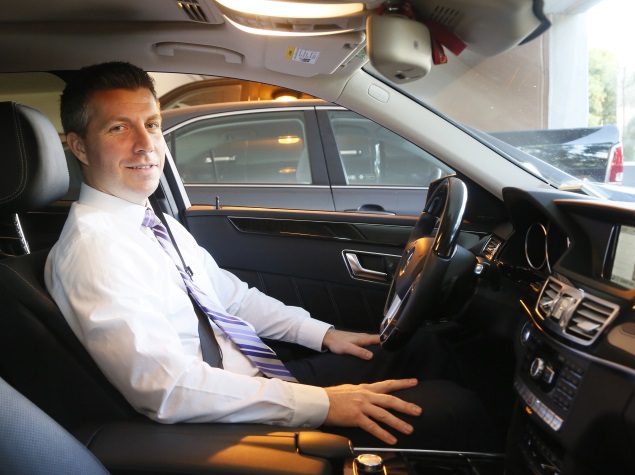- Home
- Science
- Science News
- Britain Greenlights Driverless Cars on Public Roads
Britain Greenlights Driverless Cars on Public Roads

Officials said the driverless cars would improve road safety and were an opportunity for Britain's automotive manufacturing industry to create skilled jobs.
"We are launching officially four trials of semi-autonomous vehicles, the first step on the route to driverless technology," Transport Minister Claire Perry told AFP at the unveiling of a prototype driverless car in Greenwich, southeast London.
"It's very good for road safety. Right now 93 percent of accidents are caused by driver error. It also has the opportunity to free up people's time, to give us extra time in our days. And the other opportunity is to use the road capacity better."
Britain is Europe's third biggest car producer and hopes to be a leader in developing driverless cars, which are also being tested in US cities including by Internet giant Google.
The government is providing GBP 19-million ($28.9 million, roughly Rs. 180 crores) in funding for testing in several areas of Britain.
An autonomous shuttle vehicle will be tested in the London district of Greenwich and a driverless pod prototype will be trialled in Milton Keynes in central England.
The battery-driven pod, which is designed to run on a dedicated route on the pavement, has a 40 mile (64km) range and travel at 15 miles per hour.
In addition, a driverless modified military jeep made by defence company BAE Systems will be tested in the southwest city of Bristol.
However, a survey of consumer attitudes found the British public to be wary of the idea of driverless cars.
Just under half of those surveyed by price comparison website uSwitch.com said they would be unwilling to be a passenger in a driverless car, while 16 percent were "horrified" by the idea.
As the project was announced in Greenwich, Perry and Business Secretary Vince Cable took a ride in a driverless car to demonstrate the technology.
After riding in the "Meridian shuttle", a white open cart resembling a golf buggy, Perry called the project "incredibly exciting".
Cable said the driverless car industry globally is predicted to be worth GBP 900 billion by 2025 and would create employment.
"There has to be public acceptance, people to have complete confidence that they're safe and the regulation and the insurance principles operates and so that is happening in parallel with technological development," Cable told AFP.
A government review found that there was no legal barrier to the testing of automated cars on public roads.
However, road regulations such as the Highway Code need to be updated to allow for the new technology, something that is expected to take until summer 2017.
Catch the latest from the Consumer Electronics Show on Gadgets 360, at our CES 2026 hub.
Related Stories
- Samsung Galaxy Unpacked 2025
- ChatGPT
- Redmi Note 14 Pro+
- iPhone 16
- Apple Vision Pro
- Oneplus 12
- OnePlus Nord CE 3 Lite 5G
- iPhone 13
- Xiaomi 14 Pro
- Oppo Find N3
- Tecno Spark Go (2023)
- Realme V30
- Best Phones Under 25000
- Samsung Galaxy S24 Series
- Cryptocurrency
- iQoo 12
- Samsung Galaxy S24 Ultra
- Giottus
- Samsung Galaxy Z Flip 5
- Apple 'Scary Fast'
- Housefull 5
- GoPro Hero 12 Black Review
- Invincible Season 2
- JioGlass
- HD Ready TV
- Laptop Under 50000
- Smartwatch Under 10000
- Latest Mobile Phones
- Compare Phones
- OPPO Reno 15 FS
- Red Magic 11 Air
- Honor Magic 8 RSR Porsche Design
- Honor Magic 8 Pro Air
- Infinix Note Edge
- Lava Blaze Duo 3
- Tecno Spark Go 3
- iQOO Z11 Turbo
- Lenovo Yoga Slim 7x (2025)
- Lenovo Yoga Slim 7a
- Lenovo Idea Tab Plus
- Realme Pad 3
- Moto Watch
- Garmin Quatix 8 Pro
- Haier H5E Series
- Acerpure Nitro Z Series 100-inch QLED TV
- Asus ROG Ally
- Nintendo Switch Lite
- Haier 1.6 Ton 5 Star Inverter Split AC (HSU19G-MZAID5BN-INV)
- Haier 1.6 Ton 5 Star Inverter Split AC (HSU19G-MZAIM5BN-INV)







![[Sponsored] Haier C90 OLED TV | Dolby Vision IQ, 144Hz OLED and Google TV in Action](https://www.gadgets360.com/static/mobile/images/spacer.png)









